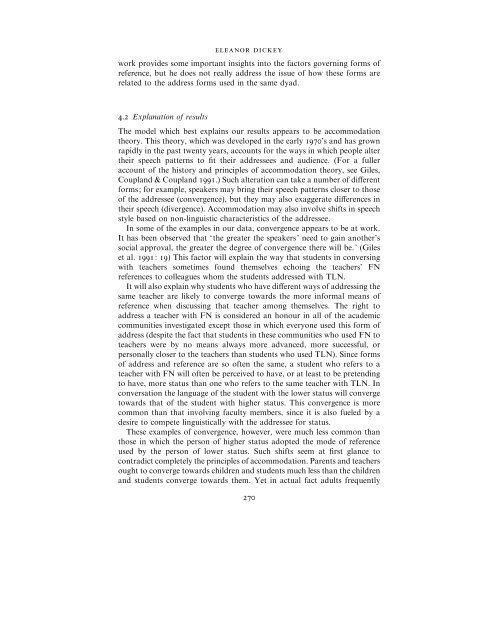Forms of address and terms of reference - Exeter Research and ...
Forms of address and terms of reference - Exeter Research and ...
Forms of address and terms of reference - Exeter Research and ...
Create successful ePaper yourself
Turn your PDF publications into a flip-book with our unique Google optimized e-Paper software.
eleanor dickey<br />
work provides some important insights into the factors governing forms <strong>of</strong><br />
<strong>reference</strong>, but he does not really <strong>address</strong> the issue <strong>of</strong> how these forms are<br />
related to the <strong>address</strong> forms used in the same dyad.<br />
4.2 Explanation <strong>of</strong> results<br />
The model which best explains our results appears to be accommodation<br />
theory. This theory, which was developed in the early 1970’s <strong>and</strong> has grown<br />
rapidly in the past twenty years, accounts for the ways in which people alter<br />
their speech patterns to fit their <strong>address</strong>ees <strong>and</strong> audience. (For a fuller<br />
account <strong>of</strong> the history <strong>and</strong> principles <strong>of</strong> accommodation theory, see Giles,<br />
Coupl<strong>and</strong> & Coupl<strong>and</strong> 1991.) Such alteration can take a number <strong>of</strong> different<br />
forms; for example, speakers may bring their speech patterns closer to those<br />
<strong>of</strong> the <strong>address</strong>ee (convergence), but they may also exaggerate differences in<br />
their speech (divergence). Accommodation may also involve shifts in speech<br />
style based on non-linguistic characteristics <strong>of</strong> the <strong>address</strong>ee.<br />
In some <strong>of</strong> the examples in our data, convergence appears to be at work.<br />
It has been observed that ‘the greater the speakers’ need to gain another’s<br />
social approval, the greater the degree <strong>of</strong> convergence there will be.’ (Giles<br />
et al. 1991: 19) This factor will explain the way that students in conversing<br />
with teachers sometimes found themselves echoing the teachers’ FN<br />
<strong>reference</strong>s to colleagues whom the students <strong>address</strong>ed with TLN.<br />
It will also explain why students who have different ways <strong>of</strong> <strong>address</strong>ing the<br />
same teacher are likely to converge towards the more informal means <strong>of</strong><br />
<strong>reference</strong> when discussing that teacher among themselves. The right to<br />
<strong>address</strong> a teacher with FN is considered an honour in all <strong>of</strong> the academic<br />
communities investigated except those in which everyone used this form <strong>of</strong><br />
<strong>address</strong> (despite the fact that students in these communities who used FN to<br />
teachers were by no means always more advanced, more successful, or<br />
personally closer to the teachers than students who used TLN). Since forms<br />
<strong>of</strong> <strong>address</strong> <strong>and</strong> <strong>reference</strong> are so <strong>of</strong>ten the same, a student who refers to a<br />
teacher with FN will <strong>of</strong>ten be perceived to have, or at least to be pretending<br />
to have, more status than one who refers to the same teacher with TLN. In<br />
conversation the language <strong>of</strong> the student with the lower status will converge<br />
towards that <strong>of</strong> the student with higher status. This convergence is more<br />
common than that involving faculty members, since it is also fueled by a<br />
desire to compete linguistically with the <strong>address</strong>ee for status.<br />
These examples <strong>of</strong> convergence, however, were much less common than<br />
those in which the person <strong>of</strong> higher status adopted the mode <strong>of</strong> <strong>reference</strong><br />
used by the person <strong>of</strong> lower status. Such shifts seem at first glance to<br />
contradict completely the principles <strong>of</strong> accommodation. Parents <strong>and</strong> teachers<br />
ought to converge towards children <strong>and</strong> students much less than the children<br />
<strong>and</strong> students converge towards them. Yet in actual fact adults frequently<br />
270
















